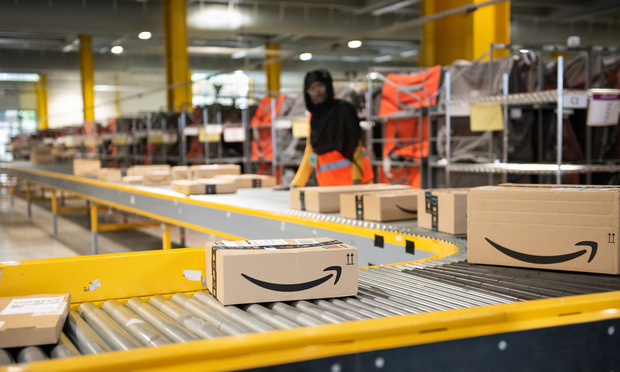3rd Circ. Sends Amazon Products Liability Case to Pa. Supreme Court
The ruling comes after the Third Circuit reheard the case en banc. Prior to that, the a split court ruled 2-1 that Amazon could be held liable.
June 03, 2020 at 02:42 PM
3 minute read
 Photo: Frederic Legrand/Shutterstock
Photo: Frederic Legrand/Shutterstock
Unable to predict whether the Pennsylvania Supreme Court would hold Amazon strictly liable for a third-party vendor's defective product, the U.S. Court of Appeals for the Third Circuit has sent the case to the state high court, asking it to weigh in.
The court's decision came in the case of Oberdorf v. Amazon.com, in which the plaintiff was injured when a dog leash, purchased on Amazon, broke and hit her in the face. The central question in case was whether the Restatement (Second) of Torts Section 402A applies to Amazon.
"This is an issue of first impression and substantial public importance, yet we cannot discern if and how Section 402A applies to Amazon. We are, as a result, unable to predict how the Pennsylvania Supreme Court would rule in this dispute," Chief Judge D. Brooks Smith wrote in the court's order.
The ruling comes after the Third Circuit reheard the case en banc. Prior to that, the a split court ruled 2-1 that Amazon could be held liable.
Amazon had argued that, under the test outlined in a 1989 Pennsylvania Supreme Court decision, it could not be held liable as a "seller," but Senior Judge Jane Richards Roth, who wrote the Third Circuit's July majority opinion, determined that because the company was in a position to prevent the circulation of defective products and because imposing liability would incentivize safety that test weighed more in favor of designating the company as a "seller" under 402A.
"Amazon's customers are particularly vulnerable in situations like the present case," Roth said. "Neither the [plaintiffs] nor Amazon has been able to locate the third-party vendor, The Furry Gang. Conversely, had there been an incentive for Amazon to keep track of its third-party vendors, it might have done so."
The ruling bucked a recent trend where both the Fourth and Sixth circuits held that the company could not be liable as a seller under state products liability laws.
In its request to have the initial ruling reconsidered, Amazon contended that the ruling conflicted with other districts and argued the appeal judges had been acting as "judicial pioneers," establishing a precedent with "no practical limit."
"The majority's decision 'substantially widen[s]' the scope of liability for online stores and marketplaces operating in Pennsylvania, including Amazon, eBay, Walmart Marketplace, and smaller businesses like Etsy, Bonanza, and Jet," Amazon said in its petition.
David Wilk of Lepley, Engelman, Yaw & Wilk in Williamsport represents the plaintiff.
"Based on the amount of time the en banc panel spent on the issue during the oral argument in February, it really comes as no surprise that the court went in this direction," he said. "We look forward to presenting our arguments to the Pennsylvania Supreme Court."
Perkins Coie attorney Brendan Murphy, who is representing Amazon, did not respond to a request for comment.
This content has been archived. It is available through our partners, LexisNexis® and Bloomberg Law.
To view this content, please continue to their sites.
Not a Lexis Subscriber?
Subscribe Now
Not a Bloomberg Law Subscriber?
Subscribe Now
NOT FOR REPRINT
© 2025 ALM Global, LLC, All Rights Reserved. Request academic re-use from www.copyright.com. All other uses, submit a request to [email protected]. For more information visit Asset & Logo Licensing.
You Might Like
View All
JCPenney Customer's Slip-and-Fall From Bodily Substance Suit Best Left for a Jury to Decide, Judge Rules
4 minute read


Federal Judge Dismisses Digital Privacy Suit Against E-Commerce Company
4 minute readLaw Firms Mentioned
Trending Stories
Who Got The Work
J. Brugh Lower of Gibbons has entered an appearance for industrial equipment supplier Devco Corporation in a pending trademark infringement lawsuit. The suit, accusing the defendant of selling knock-off Graco products, was filed Dec. 18 in New Jersey District Court by Rivkin Radler on behalf of Graco Inc. and Graco Minnesota. The case, assigned to U.S. District Judge Zahid N. Quraishi, is 3:24-cv-11294, Graco Inc. et al v. Devco Corporation.
Who Got The Work
Rebecca Maller-Stein and Kent A. Yalowitz of Arnold & Porter Kaye Scholer have entered their appearances for Hanaco Venture Capital and its executives, Lior Prosor and David Frankel, in a pending securities lawsuit. The action, filed on Dec. 24 in New York Southern District Court by Zell, Aron & Co. on behalf of Goldeneye Advisors, accuses the defendants of negligently and fraudulently managing the plaintiff's $1 million investment. The case, assigned to U.S. District Judge Vernon S. Broderick, is 1:24-cv-09918, Goldeneye Advisors, LLC v. Hanaco Venture Capital, Ltd. et al.
Who Got The Work
Attorneys from A&O Shearman has stepped in as defense counsel for Toronto-Dominion Bank and other defendants in a pending securities class action. The suit, filed Dec. 11 in New York Southern District Court by Bleichmar Fonti & Auld, accuses the defendants of concealing the bank's 'pervasive' deficiencies in regards to its compliance with the Bank Secrecy Act and the quality of its anti-money laundering controls. The case, assigned to U.S. District Judge Arun Subramanian, is 1:24-cv-09445, Gonzalez v. The Toronto-Dominion Bank et al.
Who Got The Work
Crown Castle International, a Pennsylvania company providing shared communications infrastructure, has turned to Luke D. Wolf of Gordon Rees Scully Mansukhani to fend off a pending breach-of-contract lawsuit. The court action, filed Nov. 25 in Michigan Eastern District Court by Hooper Hathaway PC on behalf of The Town Residences LLC, accuses Crown Castle of failing to transfer approximately $30,000 in utility payments from T-Mobile in breach of a roof-top lease and assignment agreement. The case, assigned to U.S. District Judge Susan K. Declercq, is 2:24-cv-13131, The Town Residences LLC v. T-Mobile US, Inc. et al.
Who Got The Work
Wilfred P. Coronato and Daniel M. Schwartz of McCarter & English have stepped in as defense counsel to Electrolux Home Products Inc. in a pending product liability lawsuit. The court action, filed Nov. 26 in New York Eastern District Court by Poulos Lopiccolo PC and Nagel Rice LLP on behalf of David Stern, alleges that the defendant's refrigerators’ drawers and shelving repeatedly break and fall apart within months after purchase. The case, assigned to U.S. District Judge Joan M. Azrack, is 2:24-cv-08204, Stern v. Electrolux Home Products, Inc.
Featured Firms
Law Offices of Gary Martin Hays & Associates, P.C.
(470) 294-1674
Law Offices of Mark E. Salomone
(857) 444-6468
Smith & Hassler
(713) 739-1250





